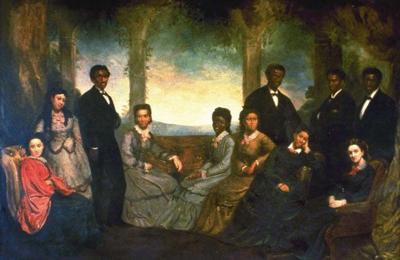I was looking for descendants of famed Nashvillian Preston Taylor. (Short answer — if any exist, they probably don’t know they’re descended from him. The one child he had in Nashville died as a baby.) That got me looking into the family of his wife, Georgia Gordon Taylor.
Georgia Gordon Taylor was one of the original Fisk Jubilee Singers. If you’ve seen the famous painting of said Fisk Jubilee Singers, Georgia Gordon is the woman farthest right. She has her own Wikipedia page.
Over the years, we’ve been talking about history that doesn’t look like we expect it to, how some Black Nashvillians subverted slavery by buying their own enslaved family members and then subverted the law that said freed slaves had to leave Tennessee by not ever technically, legally freeing them — even as we see evidence that the enslaved family members took on some vestments of freedom, such as being counted in the census. We’ve also talked about the way that we’re clearly missing pieces of the puzzle because we haven’t understood how Black women chose or utilized last names in the last half of the 19th century. And we’ve talked about white people not acting how we’d expect.
Georgia’s family has all this and more. We’re going to start with her grandparents. Duke Wilson was a free man of color who first shows up in the census in Tennessee in 1830, when he’s about 50 years old. Wilson is a common name in both Sumner County and (wait for it) Wilson County. But with him being born in 1780, it puts him in a very small group of Wilsons that age. Was he related to other Wilsons in the county? I don’t know.
What I do know is that his wife is white. That’s clear in the 1830 census. Family lore gives her name as Nancy Duke. There are almost no other Dukes in Sumner County her age, and none of them seem like family. Back in North Carolina, where Duke Wilson says he’s from, there are (as you might guess) a number of Dukes who could be Nancy’s family. In 1838, Duke Wilson acquires 40 acres of land along East Station Camp Creek. Nancy dies in 1839, leaving Duke with five children that we know of. In 1850, he reports that his job is as a fiddler.
This next generation is where it gets interesting. There’s one son, Governor, and we’re just going to ignore him because there’s nothing much on him. Instead we’re going to focus on the four sisters — Elizabeth, Yessey, Mercy and Pleasure. Elizabeth married a man whose last name was Allen. Considering that Elizabeth was born in 1822 in Sumner County, we can probably assume this was someone either from or owned by Eliza Allen’s family — the brief teenage bride of Sam Houston. Elizabeth had two daughters who we know about, Amanda and Adelaide. Adelaide married the Rev. Sterling Brown. Their daughter, Mary Edna, was a founder of Delta Sigma Theta sorority. Their son was poet Sterling Allen Brown.
Next is Yessey. Yessey married a white tailor from Gallatin named Alfred White. They had at least one son, named Charles Henry White. After that Yessey disappears from records. Alfred remarries, this time to a white woman, Harriet Rankin. She’s the one who gets his Civil War pension, which is how we know that Alfred fought with the Ohio Infantry.
Pleasure married Thomas Trimble, a cook, and she worked as a seamstress.
But it is through Georgia’s mother that we see the full scope of strangeness. We know, beyond a doubt, that the name of these women’s father was Duke Wilson. But in the 1850 census, where we find Duke and his family, only his son has his same last name. Elizabeth, Yessey, Mercy and Pleasure are all listed under the last name Scolds. There are also some younger kids with that same last name — James, Charles and Elwiny. Elwiny is probably Mercy’s oldest daughter, Elvina. Charles is the exact right age to be Yessey’s son, Charles. I’m not sure who James is. Possibly Charles’ brother? Later on, Mercy becomes Mercy Gordon once her marriage to George Gordon is legally recognized, but we know she was still using the last name Scolds in 1860 because that’s the name she’s listed under in the slave census. Why is Mercy Scolds listed in the slave census. Oh, because she owns a man in 1860. This man is her husband, George Gordon.
After George dies in 1870, we find Mercy with a house full of people. Elvina Warner (her daughter), Georgia Gordon (her other daughter), Pleasure Trimble (her sister), Fanny Stiffey, Amanda Allen (her niece), George White (another possible brother of Charles), Adelaide Allen (niece) and Lizzie Cheatham.
The family seems to remain incredibly close for generations. In her will, Georgia leaves everything to her niece, Hermine Walker. And everything is a lot. She owned some property in Washington, D.C. (possibly to be closer to her sister, whose family had become very prominent at Howard), and some property in Prince George County, Md., as well as two houses that Georgia owns in Nashville — one on Fourth Avenue North and one on Jo Johnston.
I don’t know what to make of the appearance of the last name Scolds. It’s not an incredibly common last name. The site Find a Grave lists only a handful of Scolds, and none of them lived in Tennessee. But I do think that we’re seeing another family who thrived, because they stuck together.
Dr. Josie Wells, who received a historical marker this week, was one of the witnesses to Georgia Gordon Taylor’s will.
Nashville, I’m going to tell you a secret that will make sense of a number of things you may have not consciously realized didn’t make sense: In certain narrow and specific circumstances, some Black folks had it better than some white people, and everyone knew it, which was an enormous threat to the racist social order. In spite of white Nashville’s every effort to be a racist Gomorrah — from burning down Black schools to lynchings to vandalizing Black-owned streetcars to forcing Roger Williams University to close to neglecting Black public schools and so on and so on — some Black people did manage to accumulate a little wealth and secure opportunities for their kids. And at the same time white society was coalescing around the idea of the Angel in the House — an ideology in which white women were supposed to stay home, being domestic, pleasant and innocent — Black women held jobs, opened bank accounts in their own names, went to college, became doctors, owned property and toured the world, among other things. (Just using as examples the accomplishments of the women mentioned in this column.)
Take a minute to appreciate what a threat this was to the social order. In the Jim Crow era, the one thing all white people of any social class were supposed to be able to rest assured in was in the fact that white people were better than Black people. But how do you measure “better”? If you’re a wealthy white woman with any smarts or gumption, you were going to notice that Black women who had less money than you (even if they also might have had a great deal of money, they didn’t have rich-white-people levels of money) had more opportunities than you and paid far less social costs for taking them.
But here’s the thing: White women did not say, “We want these things, too." They said, “You should not have them either.” Because white women were so damn racist, white women couldn’t envy Black women’s accomplishments without it massively screwing with their heads. White women would rather no one have nice things than be in a position of wanting things their “lessers” had that they didn’t.
But what I’m hoping you’ll see is that this attitude, that white people are better than everyone else, makes things so much harder for friends and neighbors and community members of color, and it cheats us all. Here’s a family from Nashville. One cousin was a highly influential poet and folklorist. Another was a famous world-traveling singer. The whole family was closely tied in with a local university. For the white Nashville readers: Did you know about them?
Do you think it is an accident that you don’t know about them? Or do you think that, every step of the way, people with power made decisions about what was worthwhile for people to know and remember about Nashville, and stories like this don’t make the cut, because white Nashville is still not comfortable with putting white Nashvillians in a position to admire Black Nashvillians?





